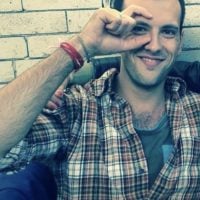View this post on Instagram
Editor’s Note: Elephant is not your doctor or hospital. Our lawyers would say “this website is not designed to, and should not be construed to provide medical advice, professional diagnosis, opinion, or treatment to you or any other individual, and is not intended as a substitute for medical or professional care and treatment. Always consult a health professional before trying out new home therapies or changing your diet.” But we can’t afford lawyers, and you knew all that. ~ Ed.
My first addiction was using my imagination to escape.
It began when I took my therapist’s advice to imagine a great, impenetrable wall which would protect me. This became something of a ritual. Every night, before bed, I would imagine such an impressive structure surrounding myself. And, only then, could I fall asleep. In time, this lead to imagining new stories. I imagined myself as an adult, so strong and so invulnerable.
But these stories lead me to start forgetting about myself, and eventually, I started experiencing what we call disassociating episodes, or depersonalisation. I would wake at night, or in the middle of a daydream, feeling as if I were somehow not myself. Things moved too slowly, yet too quickly all at once. Nothing seemed real. This frightened me, yet I kept it all to myself. In an attempt to combat this addiction, I chose to hide from my worrisome imagination, afraid of where it might take me.
And so I found my new addiction.
Food became my new escape, and I would eat—just as unconsciously as I was with my thoughts—until I was so full that the pressure within made everything seem manageable. It wasn’t until my mid-teens that I realised my eating could be dangerous. In fear, again, I ran from this addiction only to find a new one.
This time, it was my relationship with spirituality. I’d even found the perfect place for it—the ashram. The strict regimen kept me from overeating, while my lack of free time kept me from overthinking. And yet, choosing to believe that the many mystic practices I took part in could be some otherworldly salve, I again found myself playing my old role.
Spiritual addiction is a tricky one to come to terms with. For one, a lot of the practices involved are meant to rid us of the things we may have come to believe were wounding us in the first place—like the ego, for instance. And, in the practice, we aren’t drinking excessively or shooting up so we are led to believe we must be leading ourselves toward a higher consciousness. So it must be better, right?
In truth, I was just using it as a new kind of bandage—a new addiction. This one was just shinier, and I could justify it somehow.
And yet, this bandage grew old and unhelpful.
When I was diagnosed with cancer, I had to confront my own feeling, of how could it possibly be fair that something like this would happen to me, after everything I have faced in my life. I was still holding on to another kind of salve, you see. I still thought that if I did “this”, then “that” thing would surely happen. And even this belief was a kind of addiction.
I was addicted to the notion that if I were only good enough, then good things would come my way.
And it took me a while to let that go. There I was. Still alive after cancer, but still feeling as if I lacked something; there was something I still had to fill up inside.
It took me the better part of 30 years to start loosening my own grip on what it meant to be alright—to be good and perfect just as I was.
Addiction is no joke. We are all addicted to something—even if it is overthinking.
Yet, we like to discuss addiction as if it were some sort of medical disorder—like there is something wrong with us that we just need to fix or heal with this or that. Medication maybe, or abstinence.
For myself, healing my addictions meant delving into that which made me feel the most tender, the most vulnerable. It meant facing those feelings. For myself, those feelings lead to my understanding—and coming to terms with—the feeling that I did not have the support I needed as a child. I had felt alone. Unloved. And so I had searched for those feelings elsewhere.
I have yet to become addicted to illicit substances. And yet, I know for certain that I have faced addiction throughout my life—searching for something to make me feel whole.
To make me feel good enough. Or, that I wasn’t too much.
Our stories may be different. We may have taken different twists and turns—our own flavour of emotional wounding. And we may come out the other end—fiercer, brighter, and more ourselves than we ever thought possible.
I never thought it possible for myself. Not ever. Yet here I sit, writing this. And no, I have not figured it all out. Whatever that means.
I am still trying. And yet that seems to be all we can do. We can try. We can keep trying.
And somehow, I have faith in that—in such a small thing as trying.
~






Read 2 comments and reply